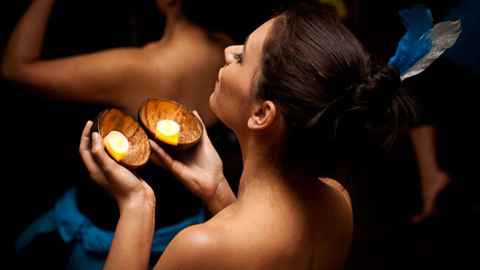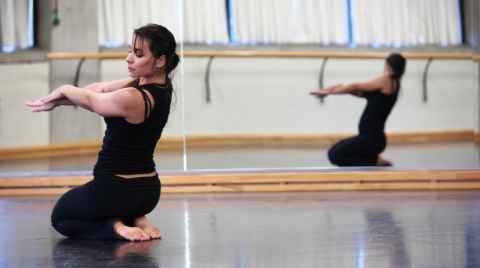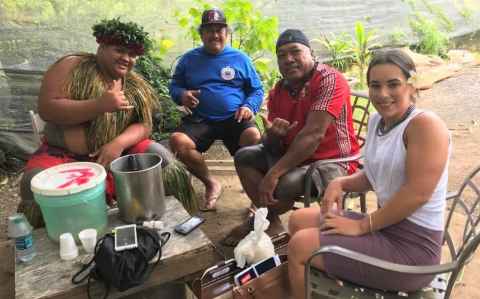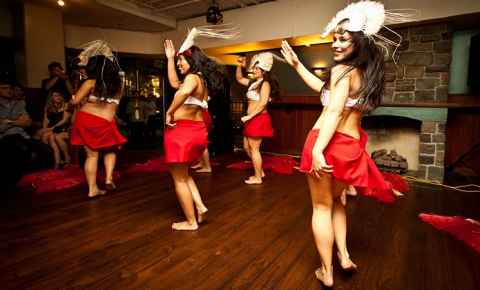Teuila Hughes
Teuila discusses her Samoan heritage, dance and how these two passions combine in her doctoral research.

Key facts
Research topic: Towards a deconstruction of Pacific dance: navigations of Samoan dance practices within the concepts of ‘Pacific’ ethnic lumping.
Supervisors: AP Nicholas Rowe and Dr Rosemary Martin
Faculty: Arts and Education; Dance
Tell us about your journey to PhD study
Dance has always been a passion of mine. I grew up in Fiji and being raised there meant I was surrounded by Pacific Island dance forms from an early age. When I was five, my mother took my sister and me to Samoan dance classes as a way of connecting with our cultural heritage. From there, I learnt and performed a range of Pacific dance styles, which established my identity as a dancer.
That passion eventually brought me to the University of Auckland to study Dance. Honestly, it never crossed my mind to study beyond my undergraduate degree, but my lecturers, Ralph Buck and Nicholas Rowe, believed in me at a time when I didn’t fully believe in myself. They encouraged me to continue, and their support made all the difference. I think if it weren’t for them, I probably would have left university a long time ago.
I went on to complete my Postgraduate Diploma and then a Master’s degree in Dance Studies straight after. I then went on to do a Postgraduate Diploma in Teaching so I could qualify as a high school dance teacher, step into the “real world,” and earn an income. But my path shifted when I was offered a University of Auckland Doctoral Scholarship. I had only applied after being convinced by my supervisor and never expected to be successful. When the offer came, it felt like an opportunity I couldn’t walk past – and I’m glad I didn’t, because I haven’t looked back since.

Tell us about your topic
My topic focuses on siva Samoa (Samoan dance), which remains a central part of my dance practice.
While I grew up learning and performing siva Samoa on many occasions, my journey in Dance Studies prompted me to consider my practice with greater depth and criticality, asking “why” we do things the way we do. Beyond the entertainment and aesthetic ideals, I realised that I lacked a deeper understanding of the embodied cultural knowledge that grounds siva Samoa. Pursuing a PhD gave me a space to delve deeper into these embodied understandings and expand my practice as a Samoan dance artist and teacher.
My PhD research explores siva Samoa through the lens of embodiment, with a particular focus on the Indigenous Samoan concepts of the vā (relational space) and lagimalie (holistic harmony). What I’m curious about is how relationality is embodied through siva Samoa practices, and how these connections are felt, expressed, and sustained through movement. With this, I consider how the moving body holds and transmits cultural ways of knowing and being, interweaving ancestral wisdom, social values, and relational responsibilities.
What is Samoan dance, and why does this topic motivate you?
Samoan dance is many things, but for me, it’s always been a space to connect with my Samoan identity and to feel and express my cultural pride.
It is an embodied practice that holds and communicates our histories and stories – as dancers, we are ultimately storytellers. Growing up, my experiences also led me to understand siva Samoa as part of our way of celebrating, hosting and expressing hospitality to guests. In this way it is more than performance but a way of being. What lies at the heart of my practice of siva Samoa is my ability to engage and uplift the spaces I perform in, recognising the transformative power of the dance itself.
At times in my academic journey as a dancer, I felt compelled to leave this practice behind and focus on Western contemporary forms, as if that was the “valid” path to “making it” as a dancer. What motivates me now is contributing to the knowledge and recognition of siva Samoa as a practice that holds depth and complexity alongside other dance forms. There is a drive through this work to empower other Samoan and Pacific students to fully claim their identity and practices, affirming the significance of embodied Indigenous knowledge in both artistic and scholarly spaces. Currently, there is limited discourse around siva Samoa, and having the opportunity to expand this conversation is empowering.
For me, this research is about the bigger picture: it is not just for myself and completing my PhD, but a way to serve my community, preserve cultural knowledge, and support the continuation of our ways of knowing and being.
What does research look like to you?
Research for me is spending hours at the library (or on the catalogue) to only sometimes find one amazing quote to fit into your writing. You can have fulfilling days where the writing just flows, making you feel invincible, and other days where you could spend hours staring at the computer screen waiting for the words and ideas to come to you whilst asking, “Why am I doing this?” It is definitely a roller-coaster journey full of challenges and discoveries.
As a dancer, research is not only an intellectual process but an embodied one. Alongside the writing of my PhD, I have realised that it was essential to maintain my siva Samoa practice and return to the body as a source of knowing. For me, the moving body and writing process are inseparable – I realised I cannot fully analyse, interpret, or communicate the practice without embodying it myself.
One of my highlights of this journey has been in the fieldwork that connected me with inspiring people and spaces, where stories and ideas about Samoan dance were shared and celebrated. These moments really affirmed the relevance of my research and motivated me to persevere through the tough times. Sharing my work through conferences, teaching, and conversations with my family also captures my research experience. I find these exchanges significant in keeping my work alive, moving it away from being an isolated process, and providing opportunities to refine and deepen my understanding.
Research, for me, is a lived and relational journey that has taught me as much about myself, my community, and the discipline of dedication as it has about the practice of siva Samoa.

Describe your life as a doctoral researcher
My life as a doctoral researcher is a constant balancing between the dedication to my work and care for myself and my relationships. There are long hours spent reading, writing, and reflecting, while also remembering to pace myself and maintain balance so that the work remains sustainable and energising rather than overwhelming (a common experience I have felt).
I make intentional space to nourish my body, move my body, and spend time with family and friends, which keeps me grounded and replenished. While some days are harder than others to maintain this sense of balance, I try my best because I see my relationship to my research as reciprocal – the more I can give to it, the more it gives back to me through knowledge that strengthens my connections to my culture, community and self. I see this striving for balance as a sense of respect for the work and the community it is tied to.
While completing the PhD, output remains a priority, but my journey also includes engaging in University events, workshops, and projects that expand my skills and grow my networks. At times, I’ve felt the pressure to focus solely on writing and let these opportunities pass, but I’ve come to realise that they are integral to the journey and to what it means to be an emerging academic.
For me, life as a doctoral researcher is not just about researching and writing, it’s also about teaching, contributing to other projects, attending conferences, presenting, writing journal articles, and building relationships across and beyond the University. It’s such a full and layered experience, and much of my growth has come through these "other" spaces that sit alongside the PhD itself.
Have you got any advice for people starting or about to start a PhD?
Be ready for the ups and downs (there will be plenty of both). In the moments of uncertainty and the days when "life" gets in the way (it will on many occasions), stay consistent and trust that you’ve got this! Remember, the good days make the tough days worthwhile.
Find YOUR flow and remember that everyone’s journey will look different, so don’t compare yourself to others.
Find your people who will hold you and support you through it – you will need them! Connect with fellow PhD students, share experiences, and support each other. It’s easy to isolate yourself, but connecting with others will help your well-being and progress.
Most of all, just have fun with it – it’s quite the journey, but it’s been one of the most rewarding experiences of my life and most likely will be for you too.
